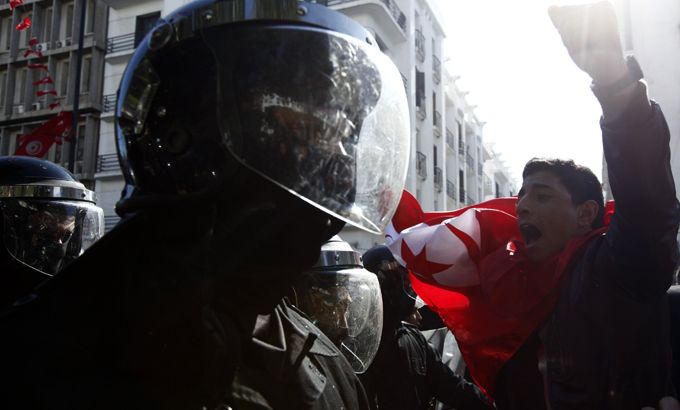
Tunisia in turmoil
Is the country’s transition towards democracy in danger of being derailed?
Tunisia has been thrown back into turmoil following the assassination of a leading opposition politician.
The murder has brought violence back to the birthplace of the Arab Spring. There is also growing anger over the slow pace of reform. It is dividing political leaders, and fuelling calls for yet more change.
|
“The assassination of Shokri Belaid is a clear message to Tunisians. The Ennahda party wants to rule the country by itself. Actually, he has been been receiving death threats for a long time.“ – Abdelmajid Belaid, the brother of Shokri Belaid |
Tunisia’s revolt was hailed as a blueprint for the Arab uprisings; the removing of a long time dictator and the transition to democratic parliamentary elections.
But more than two years after the uprising, political tensions persist. Politicians have been arguing over the allocation of important ministries as they struggle to honour promises of reform.
Now the calculated murder of Shokri Belaid, a prominent opposition figure, has seen protesters flood back onto the streets.
Belaid had been a strong critic of Tunisia’s former ruler, Ben Ali. He worked as a lawyer, and was part of the defence team of former Iraqi President Saddam Hussein. After Tunisia’s revolution, he emerged as a leading member of the Popular Front, an umbrella organisation of 12 opposition parties.
|
“This is totally new in Tunisia, we are not used to this kind of assassinations, so everybody is in a kind of shock … I do not accuse Ennahda, but it tolerated a lot of violent groups to act in the country … Ennahda is responsible for the peace in the country.“ – Youssef Cherif, a political analyst and blogger |
He was known for his outspoken secular views, and was a vocal critic of the traditional conservative government. His views earned him many enemies, according to his family, and a number of death threats.
Tunisia’s revolution was driven for the most part by hopes of a better life but for many, that is not happening.
Ahead of the revolution in 2010, unemployment stood at 13 percent – giving rise to the discontent. Two years later, it is even worse, hitting 17 percent with 800,000 Tunisians out of work.
What does the assassination mean for the birthplace of the Arab Spring? And is the country’s transition towards democracy in danger of being derailed?
Inside Story, with presenter Hazem Sika, is joined by guests: Sayyed Ferjani, a member of the political bureau of Ennahda, Tunisia’s biggest political party. Sayyed is also an adviser to the justice minister; Yassine Brahim, the executive secretary of the opposition Al Joumhouri party; and Youssef Cherif, a political analyst and blogger, specialising in the Middle East and North Africa region.
|
“We are against ruling alone even if we get ten times the number of votes that we got already in the last election. For the sake of Tunisia we shouldn’t rule alone in any shape or form. People have been suppressed for more than 50 years and out of the blue there is all the freedom that even Britain doesn’t enjoy …. Here, because we are in a transition period, whoever can say whatever …. We want progress and we want really to achieve our democracy. What we do believe is the shooting of Belaid it was a shooting to our democracy, it was a shooting to our revolution, it was a shooting to the social peace that reigns within Tunisia – all be it’s in transitional period where it’s like a vulcano, where everybody is expressing himself or herself or themselves as they wish. We know the hands of some – even foreign – powers … they don’t like the Arab Spring, they don’t like that we have this coalition between a religious orientated or Muslim orientated party with a purely secular one. They want to shoot down the new experience of Tunisia and the cradle of the Arab Spring.” Sayyed Ferjani, a member of the political bureau of Ennahda |
TUNISIA’S UPRISING:
- Tunisia’s uprising stemmed from growing dissatisfaction over unemployment, corruption and political repression
- The catalyst though was the death of the Tunisian street vendor Mohamed Bouazizi
- The 26-year-old set himself on fire in December 2010, when police confiscated his vegetable cart – and only source of income
- His death set off a wave of protests against the government
- By January 14, 2011, President Zine el-Abidine Ben Ali’s 23-year-rule was over
- Free and democratic elections were held in October 2011 and the formerly banned Ennahda party won by capturing 41 percent of the vote
- In June 2012, former president Ben Ali was sentenced absentia to life in prison for the killing of protesters. He remains in exile in Saudi Arabia.